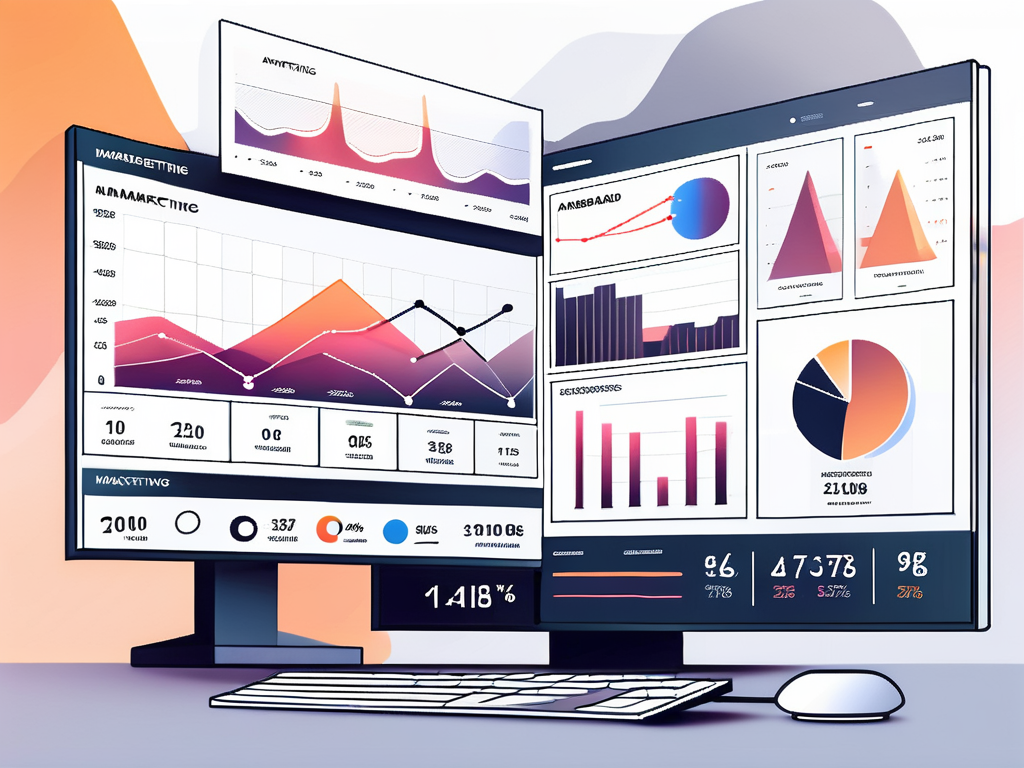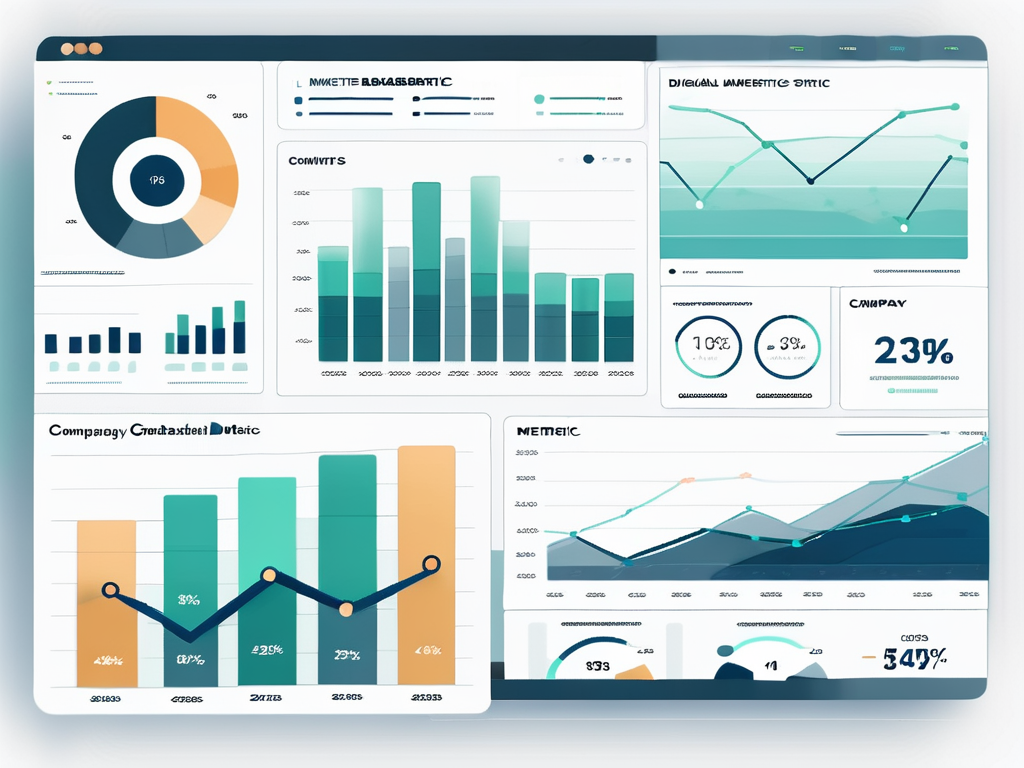In today’s digital age, data is king. The success of your digital marketing campaigns largely depends on the ability to obtain detailed reporting and analytics. In this article, we will explore the importance of detailed reporting in digital marketing, how to set up your campaigns for detailed reporting, different types of digital marketing analytics, interpreting your analytics data, the role of regular reporting and analysis, and the tools and software available for detailed digital marketing reporting.
Understanding the importance of detailed reporting
When it comes to digital marketing, detailed reporting is crucial for several reasons. First and foremost, it provides insights into the success of your campaigns. By tracking key performance metrics, you can gain a clear understanding of what is working and what needs improvement. Detailed reporting also helps you measure the return on investment (ROI) of your marketing efforts, allowing you to make data-driven decisions and optimize your strategies.
The role of analytics in successful campaigns
Analytics play a pivotal role in successful digital marketing campaigns. They allow you to track and analyze various metrics that indicate the effectiveness of your marketing efforts. Tracking metrics such as website traffic, conversions, bounce rates, and click-through rates can provide valuable insights into consumer behavior and preferences. By understanding these analytics, you can better tailor your marketing strategies to your target audience and increase your chances of success.
Key metrics to monitor in your digital marketing efforts
When it comes to digital marketing reporting and analytics, there are several key metrics that you should monitor closely. These include conversion rates, cost per acquisition, customer lifetime value, and return on ad spend. By regularly tracking these metrics, you can identify areas for improvement and make data-driven decisions to optimize your campaigns.
Furthermore, it is important to pay attention to engagement metrics such as social media likes, shares, and comments. These metrics provide valuable insights into how well your content resonates with your audience and can help you gauge the effectiveness of your social media marketing efforts. By monitoring engagement metrics, you can identify trends and patterns that can inform your content creation strategy and drive better results.
In addition to tracking metrics, it is also crucial to conduct regular competitor analysis. By keeping an eye on your competitors’ digital marketing strategies and performance, you can gain valuable insights and identify opportunities for improvement. Analyzing your competitors’ strengths and weaknesses can help you refine your own strategies and stay ahead in the ever-evolving digital landscape.
Setting up your digital marketing campaign for detailed reporting
Before diving into the world of digital marketing analytics, it’s important to set up your campaigns for detailed reporting. This involves choosing the right digital marketing platforms and implementing tracking codes and pixels to gather data effectively.
When setting up your digital marketing campaign for detailed reporting, it’s crucial to consider not only the platforms you choose but also the overall strategy you employ. Understanding your target audience’s preferences and behaviours can significantly impact the success of your campaign. Conducting thorough market research and competitor analysis can provide valuable insights that will help you tailor your approach for maximum effectiveness.
Choosing the right digital marketing platforms
When it comes to digital marketing, there are numerous platforms to choose from, each with its strengths and weaknesses. Consider your target audience and marketing objectives when selecting the platforms to use. For example, Google Ads is a powerful tool that allows you to reach a wide audience and track detailed analytics.
Furthermore, delving into social media platforms such as Instagram and LinkedIn can offer unique opportunities to engage with your audience in a more personalised manner. Understanding the nuances of each platform and how they align with your brand voice is essential for creating a cohesive and impactful digital marketing strategy.
It is also important to note that for certain industries, such as healthcare, partnering with a digital marketing agency specialising in healthcare marketing can provide additional benefits. These agencies often have a deep understanding of the industry and can provide valuable insights and strategies tailored to your specific needs.
Implementing tracking codes and pixels
In order to gather detailed reporting and analytics, you need to implement tracking codes and pixels. These codes are embedded in your website and marketing campaigns and help track user behaviour and campaign performance. Platforms like Google Analytics and Facebook Pixel provide easy-to-use tools for implementing tracking codes and pixels.
Moreover, utilising advanced features such as UTM parameters can offer a deeper level of tracking and segmentation, allowing you to measure the effectiveness of different marketing channels and campaigns with precision. By harnessing the power of data-driven insights, you can refine your digital marketing strategies and optimise your campaigns for improved performance and ROI.
Exploring different types of digital marketing analytics
Once your campaigns are set up for detailed reporting, it’s important to explore the different types of digital marketing analytics available.
Delving deeper into the realm of digital marketing analytics opens up a world of insights and opportunities for refining your strategies. By harnessing the power of data, you can gain a competitive edge in the dynamic landscape of online marketing.
Social media analytics
Social media platforms provide valuable analytics that can help you understand the impact of your social media marketing efforts. From engagement metrics like likes, comments, and shares, to demographic information about your audience, social media analytics can provide valuable insights for campaign optimization.
Understanding the nuances of social media analytics allows you to tailor your content to resonate with your target audience effectively. By analysing trends and patterns in user engagement, you can refine your social media strategy to drive meaningful interactions and achieve your marketing objectives.
Email marketing analytics
Email marketing remains one of the most effective digital marketing strategies. By tracking metrics such as open rates, click-through rates, and conversions, you can measure the effectiveness of your email campaigns and make data-driven decisions to improve your results.
Unravelling the intricacies of email marketing analytics empowers you to craft compelling campaigns that resonate with your subscribers. By interpreting data on subscriber behaviour and engagement, you can tailor your email content to drive higher conversion rates and foster long-lasting relationships with your audience.
Website and SEO analytics
Your website is the hub of your digital marketing efforts. By utilising tools like Google Analytics, you can track website traffic, user behaviour, and keyword rankings. These insights can help you optimise your website for better search engine visibility and user experience.
Diving into the realm of website and SEO analytics unveils a treasure trove of information to enhance your online presence. By analysing user interactions and search engine performance, you can fine-tune your website to boost organic traffic and enhance user engagement, ultimately driving conversions and achieving your business goals.
Interpreting your digital marketing analytics
Now that you have gathered detailed reporting and analytics, it’s time to make sense of the data. Interpreting your digital marketing analytics involves analyzing the data and translating it into actionable insights.
Understanding the intricacies of digital marketing analytics can be likened to solving a complex puzzle. Each piece of data is like a puzzle piece, and by carefully examining and piecing them together, you can reveal the bigger picture of your marketing performance. It’s not just about numbers; it’s about understanding the story they tell and using that narrative to drive your marketing strategies forward.
Making sense of your data
When interpreting your data, look for trends and patterns. Identify which marketing strategies are working and which ones need improvement. Use A/B testing to compare different approaches and determine the most effective techniques. By analyzing your data, you can uncover hidden opportunities and fine-tune your campaigns for better results.
Delving deeper into your data can unveil fascinating insights that may not be immediately apparent. For example, you might discover that a specific demographic responds particularly well to a certain type of content, or that a particular time of day yields higher engagement rates. These insights can be invaluable in shaping your future marketing efforts and tailoring them to resonate more effectively with your target audience.
Translating data into actionable insights
Data is only valuable if it leads to action. Once you have interpreted your data, it’s important to translate it into actionable insights. This may involve adjusting your targeting strategies, optimizing your ad copy, or refining your content to better resonate with your target audience. By taking action based on your analytics, you can continuously improve your digital marketing campaigns.
Furthermore, the process of translating data into actionable insights is an iterative one. As you implement changes based on your analytics, it’s crucial to monitor the results and gather new data to assess the impact of your adjustments. This continuous cycle of analysis, action, and evaluation is key to staying agile in the ever-evolving landscape of digital marketing.
Regular reporting and analysis for continuous improvement
Obtaining detailed reporting and analytics is not a one-time task. Regular reporting and analysis are essential for continuous improvement and ongoing success.
In addition to the benefits of regular reporting and analysis, it is important to delve deeper into the data to uncover hidden trends and patterns that could provide valuable insights for your marketing strategies. By conducting thorough analysis, you can identify areas for potential growth and innovation, leading to a more robust and competitive marketing approach.
Setting a schedule for regular reporting
Establish a schedule for reporting and analysis, whether it be weekly, monthly, or quarterly. Consistency is key. By reviewing your data at regular intervals, you can stay on top of your campaigns and make informed decisions to optimize your marketing strategies.
Moreover, setting specific goals and objectives for each reporting period can help focus your analysis efforts and ensure that you are tracking the metrics that matter most to your business. This targeted approach will enable you to measure progress effectively and make strategic adjustments as needed.
Using analytics for ongoing campaign optimization
Your analytics should inform your decision-making process. Use the insights gained from your reporting and analysis to make data-driven optimizations to your campaigns. Continuously monitor your key performance metrics and adjust your strategies accordingly. This iterative approach will lead to improved results over time.
Furthermore, consider implementing A/B testing and other experimentation techniques to validate the effectiveness of different marketing tactics. By testing various approaches and measuring their impact, you can refine your strategies based on empirical evidence, ultimately enhancing the performance of your campaigns.
Tools and software for detailed digital marketing reporting
Fortunately, there are numerous tools and software available to help you obtain detailed digital marketing reporting and analytics.
Overview of popular analytics tools
Some popular analytics tools include Google Analytics, Adobe Analytics, and HubSpot Analytics. These tools provide comprehensive dashboards and metrics to track the performance of your campaigns.
Selecting the right tool for your business needs
When selecting an analytics tool, consider the size and scale of your business, your specific reporting requirements, and your budget. Research and compare different tools to find the one that aligns best with your needs.
In addition to these well-known analytics tools, there are also some emerging players in the market that offer unique features and capabilities. One such tool is “Insightful Metrics,” which provides advanced data visualization and predictive analytics. With its user-friendly interface and powerful reporting capabilities, Insightful Metrics is gaining popularity among digital marketers looking for in-depth insights.
Furthermore, it’s worth mentioning that analytics tools are not limited to just tracking website performance. Social media analytics tools like Sprout Social and Hootsuite Analytics can help you monitor the effectiveness of your social media campaigns. These tools provide valuable data on engagement, reach, and audience demographics, allowing you to make data-driven decisions to optimize your social media strategy.
In conclusion, obtaining detailed reporting and analytics is crucial for the success of your digital marketing campaigns. By understanding the importance of reporting, setting up your campaigns for detailed analytics, exploring different types of analytics, interpreting your data, and regularly analyzing and optimizing your campaigns, you can achieve better results and maximize your ROI. Remember, data is power, so leverage it to your advantage and continuously improve your digital marketing efforts.
Moreover, for businesses in the healthcare industry, it’s important to seek the expertise of a digital marketing agency focused on healthcare marketing. Such agencies can provide specialized insights and strategies tailored to the unique challenges and regulations of the healthcare sector. With the ever-evolving landscape of healthcare marketing, staying up-to-date with the latest trends and regulations is crucial. A dedicated healthcare marketing agency can help you navigate through this complex environment and ensure your digital marketing efforts are compliant and effective.
As you’ve seen, detailed reporting and analytics are the cornerstones of a successful digital marketing campaign, especially in the dynamic field of healthcare. At Clinic Marketing AI, we understand the unique challenges your clinic faces and the importance of data-driven decisions. Angelo Rosati, our CEO, brings a wealth of experience and a passion for health tech to help you navigate the intersection of healthcare, marketing, and AI. We’re not just about delivering results; we’re about striving for excellence in every aspect of our partnership with you. Ready to elevate your clinic’s digital marketing strategy and transform its future? Book a Call with Us today, and let’s embark on this journey together.




